- Home
- Best Pet for Me
- Chickens, Ducks, and Geese
Pet Barnyard Birds: Chickens, Ducks, and Geese
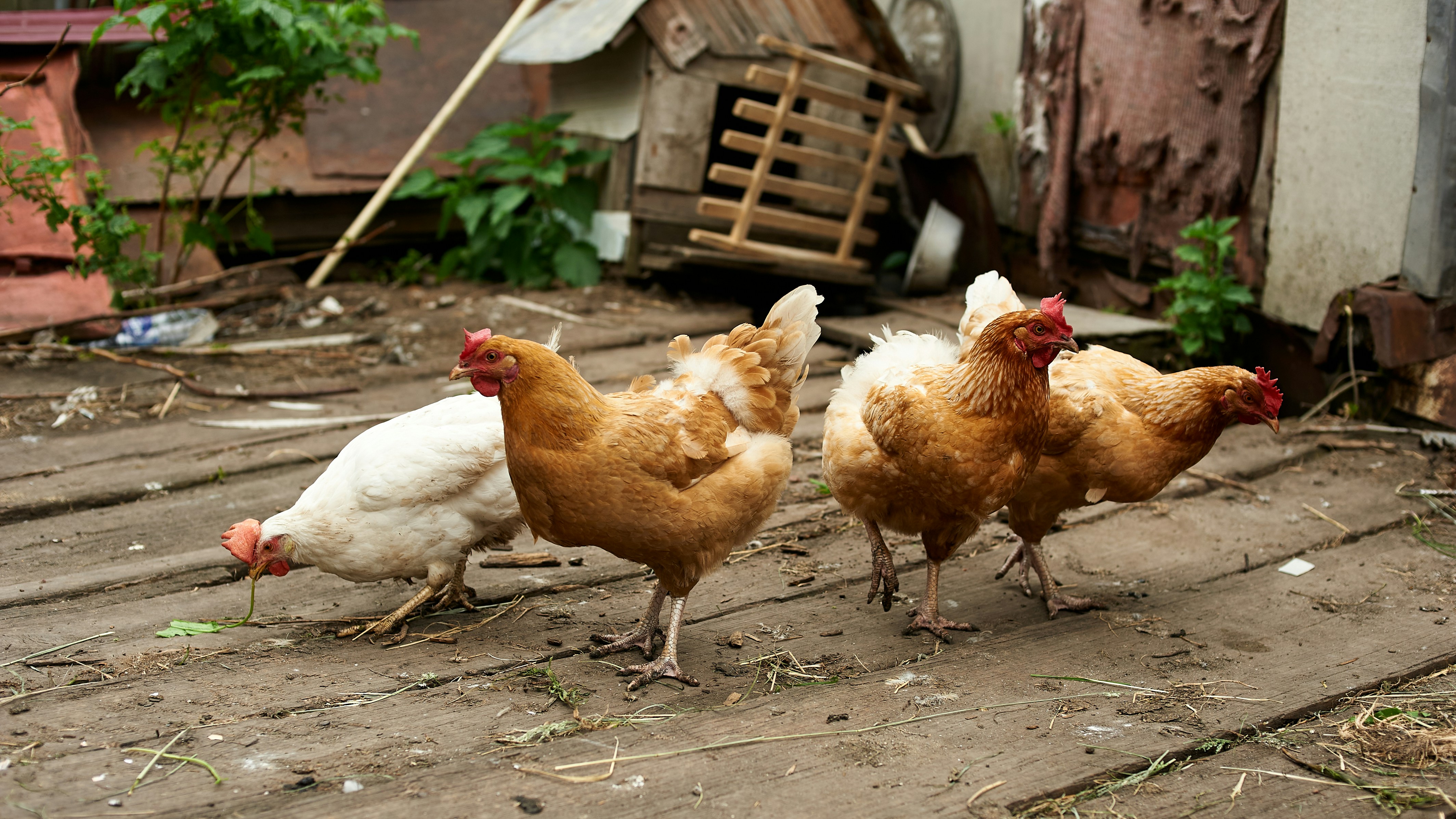 Photo by Anton Malanin. https://unsplash.com/photos/brown-and-white-hen-on-ground-RSW0UMbIkz8
Photo by Anton Malanin. https://unsplash.com/photos/brown-and-white-hen-on-ground-RSW0UMbIkz8When considering adding pet barnyard birds such as chickens, ducks, or geese to your home, it’s important to recognize the benefits and responsibilities that come with them.
One of the advantages is the fresh eggs they can provide, though it's worth noting that caring for these birds is not "free." The cost of feeding, housing, and maintaining the health of your pet birds can add up over time.
Still, having fresh eggs can be a fun and rewarding side benefit of having pet barnyard birds.
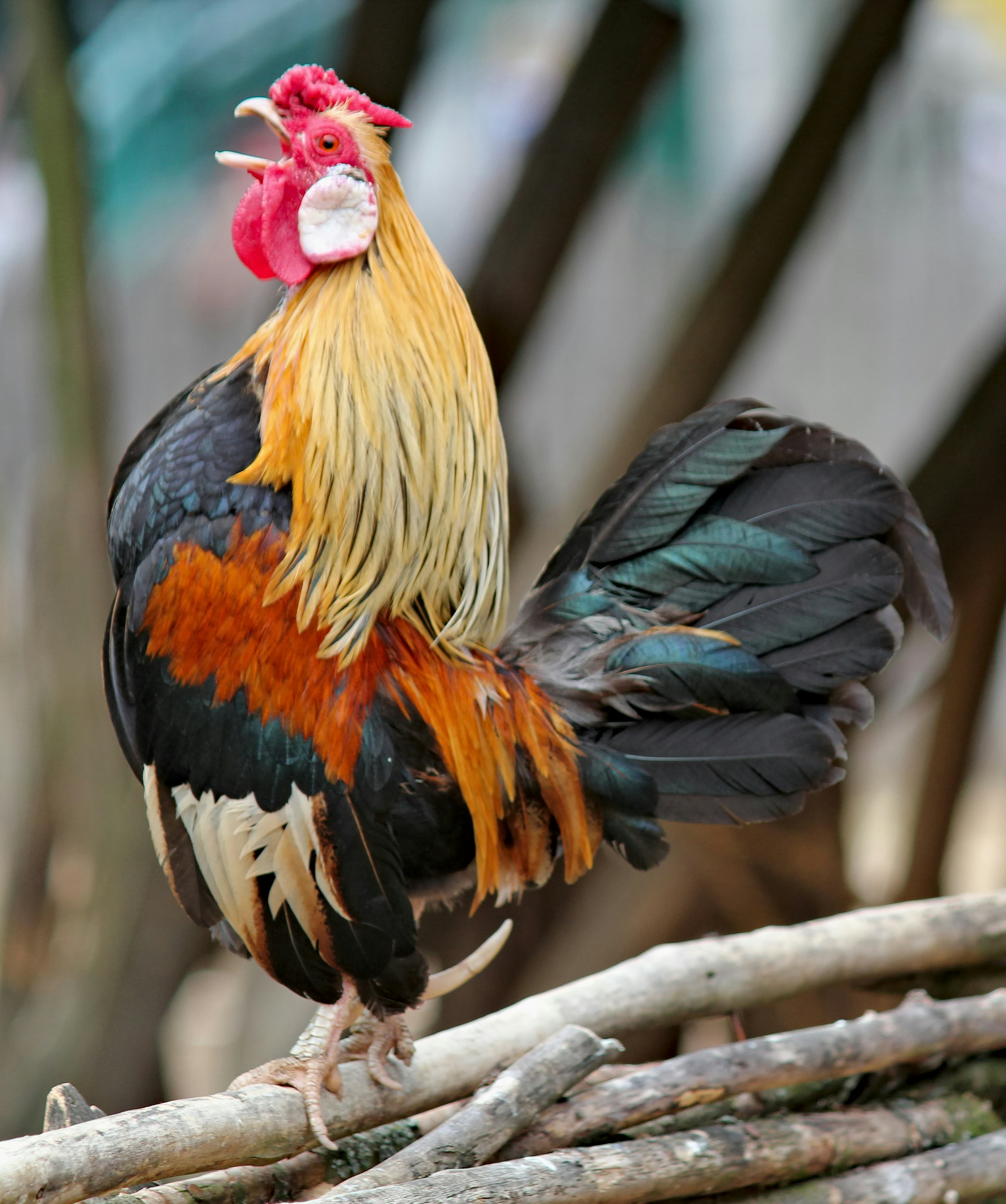 Photo by Dušan veverkolog. https://unsplash.com/photos/black-and-yellow-rooster-on-brown-slab-Fxg394rc6JQ
Photo by Dušan veverkolog. https://unsplash.com/photos/black-and-yellow-rooster-on-brown-slab-Fxg394rc6JQBefore you rescue or adopt any of these pet barnyard birds, you must first check if it’s legal in your city to keep them.
Local laws vary widely, and some places may allow chickens and ducks but not geese, or impose specific regulations about the distance your bird enclosures must be from neighboring properties.
For instance, some cities may require a chicken coop to be at least 100 feet away from the nearest home, which could be impossible if your yard is small.
It's essential to fully understand the local zoning laws, restrictions, and regulations before bringing any pet bird into your home.
Failing to comply with these rules could lead to fines or even the confiscation of your pet barnyard birds.
It’s always better to ensure you're in full legal compliance before getting your new feathered friend, even if it means working to change local laws first.
In many cities where chickens are allowed, there are often restrictions on keeping roosters. This is primarily due to the loud crowing that roosters make, which can be disruptive to neighbors.
If you unknowingly adopt a rooster, you may face the difficult situation of needing to rehome it or, in some cases, even cull it. Neither option is ideal for most pet owners, especially if you are not prepared for this responsibility.
Before adopting any chickens, it's crucial to check the laws in your area to ensure you're getting hens instead of roosters, and to understand the potential challenges of raising chickens in a residential setting.
Keeping Pet Barnyard Birds -Geese, Ducks, and Chickens: Legal Considerations and Best Breeds for Your Backyard
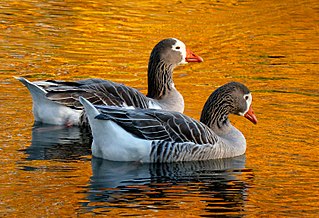 Photo by Bernard Spragg. https://commons.wikimedia.org/wiki/File:On_Golden_ponds..Pilgrim_geese._(18072502303).jpg
Photo by Bernard Spragg. https://commons.wikimedia.org/wiki/File:On_Golden_ponds..Pilgrim_geese._(18072502303).jpgKeeping Canada Geese as pets is illegal in most places due to wildlife protection laws.
These geese are considered migratory birds, and it's illegal to keep them in captivity without special permits.
If a Canada Goose is being rehomed, it is best to take it to a sanctuary where it can receive proper care and, ideally, be rehabilitated for release back into the wild.
However, there are other types of geese that are more suitable for domestication and can make good pet barnyard birds, including Toulouse, American Buff, and Pilgrim geese.
These breeds are often kept on farms or as pet barnyard birds because they are domesticated and more accustomed to living in captivity.
Before adopting any geese, it's important to check local laws and ensure that the species you are considering is legal to keep in your area.
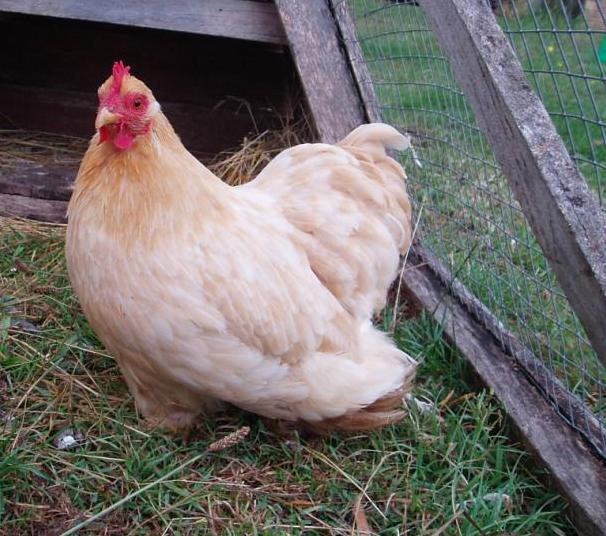 Photo by Michael Romanov. https://commons.wikimedia.org/wiki/File:Pekin_bantam_female.JPG
Photo by Michael Romanov. https://commons.wikimedia.org/wiki/File:Pekin_bantam_female.JPGThere is a wide variety of chicken, duck, and goose breeds, each with its own unique characteristics.
However, just like people, each individual bird within any breed also has its own distinct personality, making them even more interesting to keep as pets.
Bantam chickens, in particular, are a smaller version of standard chicken breeds and can be a great choice for urban living, where space might be limited.
Due to their smaller size, they require less room to roam, and their quieter nature makes them more suitable for city environments.
Some popular bantam breeds include Barred Rock, Brahma, Easter Eggers, and Leghorns.
Despite their size, these bantam chickens still retain the same charming and often feisty personalities as their larger counterparts, making them delightful pet barnyard birds for those looking to keep chickens in smaller spaces.
.
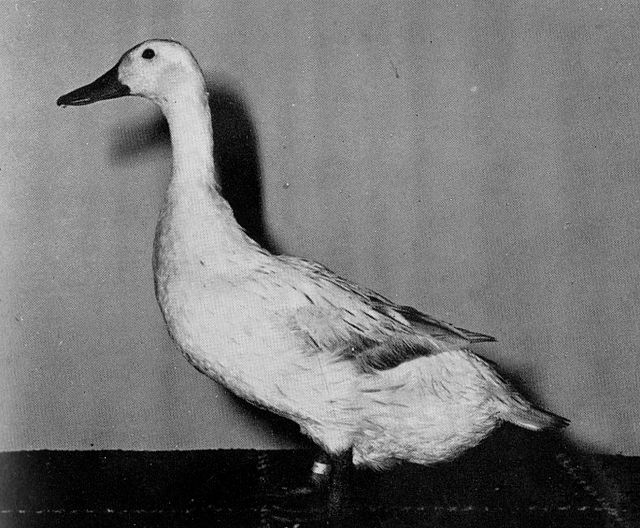 https://commons.wikimedia.org/wiki/Category:Welsh_Harlequin#/media/File:Welsh_Harlequin_Duck.jpg
https://commons.wikimedia.org/wiki/Category:Welsh_Harlequin#/media/File:Welsh_Harlequin_Duck.jpgWhen it comes to keeping ducks as pet barnyard birds, there are several breeds that stand out for their friendly nature, ease of care, and adaptability to a backyard environment.
Pekin ducks are a popular choice due to their calm temperament and large, robust size, making them great for families. They are also excellent layers of large, white eggs.
Welsh Harlequin ducks are another excellent option for backyard flocks. Known for their docile behavior and high egg production, these ducks can be friendly and sociable, making them a joy to have around. They are also hardy and can adapt well to various climates.
Muscovy ducks, unlike other duck breeds, are known for their quiet demeanor and unique, striking appearance. With their ability to form strong bonds with their owners, Muscovies can be incredibly affectionate. They also make great pet barnyard birds for those who are concerned about noise, as they are much quieter compared to other duck breeds.
These three breeds—Pekin, Welsh Harlequin, and Muscovy—are well-suited for backyard living, offering a combination of personality, productivity, and ease of care that make them wonderful additions to any home.
.
Essential Feeding Tips for Backyard Birds: Chickens, Ducks, and Geese
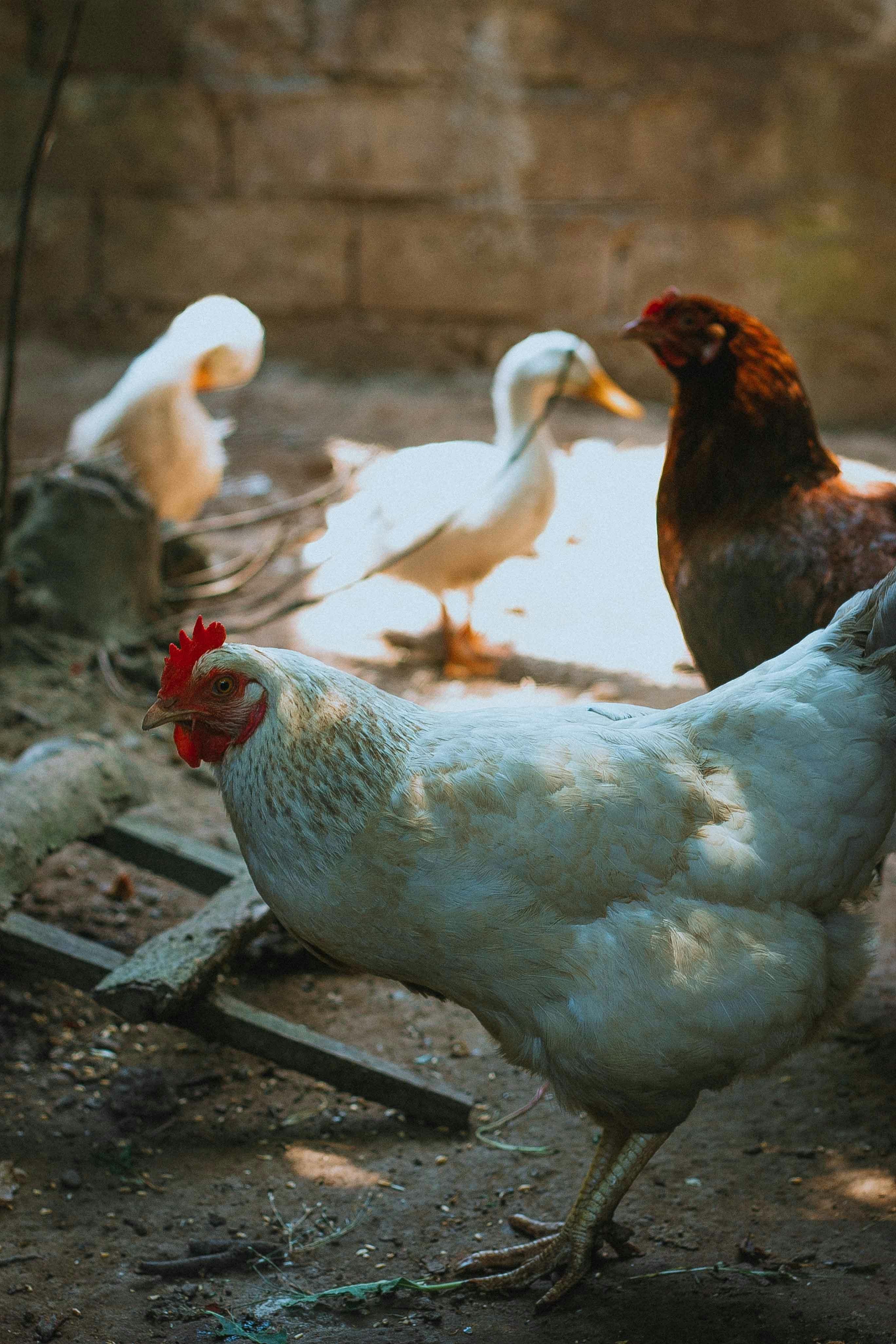 Photo by TIVASEE: https://www.pexels.com/photo/chickens-and-duck-on-eating-on-the-ground-6430988/
Photo by TIVASEE: https://www.pexels.com/photo/chickens-and-duck-on-eating-on-the-ground-6430988/Feeding your pet barnyard birds is a straightforward process, but it requires some attention to ensure they stay healthy and happy.
Chicken and duck feed, which can be bought at most feed stores, is a staple of their diet. These commercial feeds are specially formulated to provide all the essential nutrients your birds need.
It's recommended to feed them once or twice a day, depending on their age and activity level.
However, simply providing feed isn't enough—supplementing their diet with fresh vegetables and occasionally fruits is crucial for a balanced and varied nutrition.
Leafy greens like spinach, lettuce, and kale, as well as fruits like berries, apples (without seeds), and melons, can be great additions.
Geese, on the other hand, are avid grass eaters.
They love grazing on fresh grass, and it should make up the bulk of their diet.
In addition to grass, geese enjoy grains such as corn, oats, and barley, which provide extra nutrition and variety.
Vegetables such as peas, carrots, and leafy greens can also be included in their meals. It's essential to monitor their intake of grains and vegetables to ensure they're getting a good mix without overfeeding.
Providing free outdoor time for all of these birds—chickens, ducks, and geese—is also beneficial.
Allowing them to roam around and forage for worms, bugs, and other natural food sources supplements their diet and promotes healthier, more active birds.
Free ranging also helps keep their digestive systems active and allows them to express natural behaviors like scratching and pecking.
And, of course, don't forget the most important component: fresh, clean drinking water.
All poultry needs access to clean water at all times, especially in warmer weather.
Without proper hydration, they can become lethargic, and it can lead to other health issues. Be sure to regularly change the water, especially if they spill or dirty it while foraging.
Essential Shelter Tips for Keeping Your Pet barnyard Birds Happy and Safe from Predators
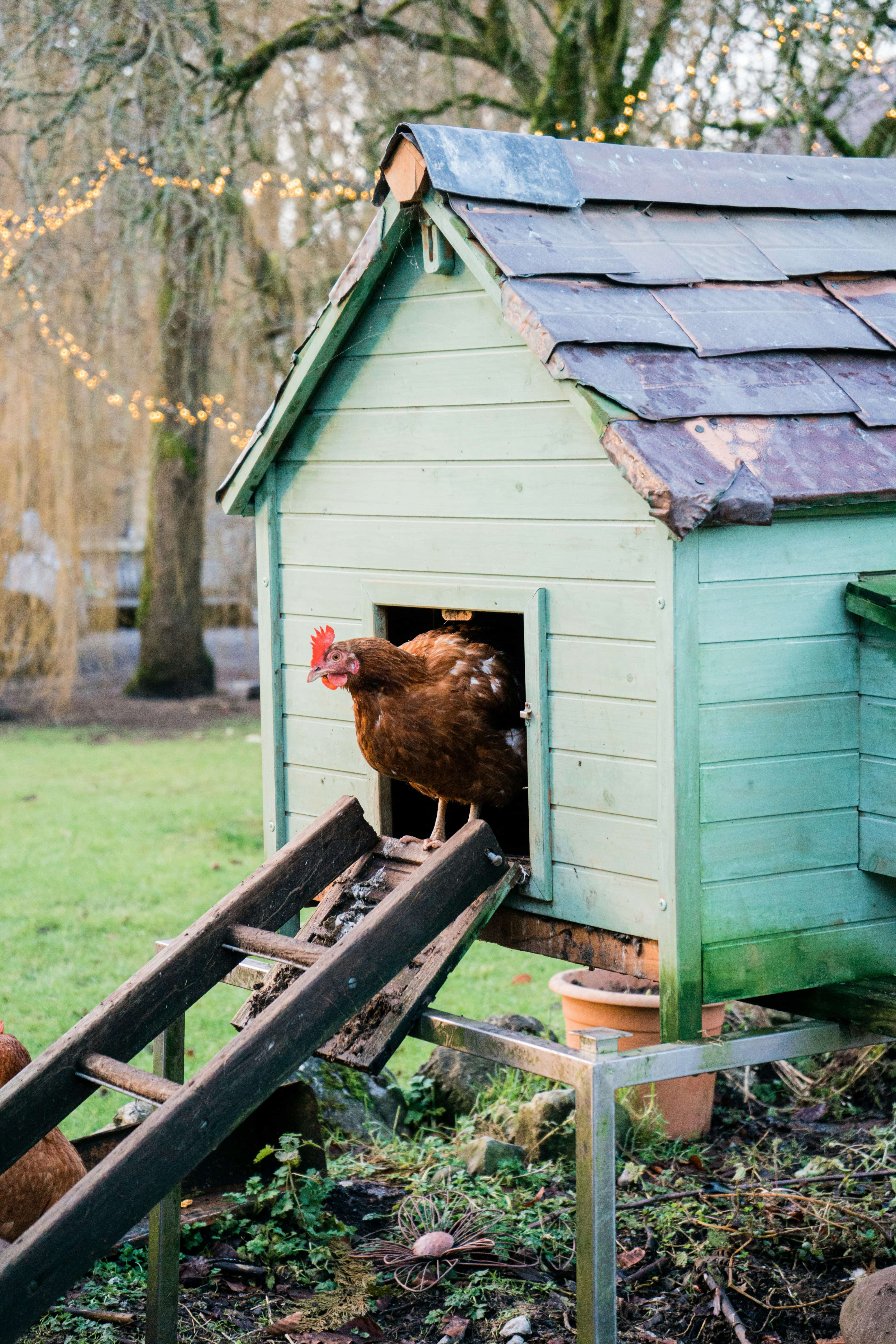 Photo by Tom Ungerer on Unsplash. https://unsplash.com/photos/brown-hen-on-brown-wooden-fence-ej5XXS8_2B8
Photo by Tom Ungerer on Unsplash. https://unsplash.com/photos/brown-hen-on-brown-wooden-fence-ej5XXS8_2B8Providing proper shelter for your pet barnyard birds is essential to keeping them safe and comfortable.
Birds like chickens, ducks, and geese are vulnerable to a range of predators, especially in urban areas.
Common threats include rats, raccoons, roaming dogs, and even hawks.
To protect your pets from these dangers, you must ensure they have a secure shelter where they can retreat at night or during harsh weather.
For chickens, a well-built chicken coop is a must.
It should be tall enough to allow the birds to roost comfortably, with sturdy perches that give them a place to sleep off the ground. Roosting helps chickens stay safe from predators and ensures they have a good night’s rest.
Additionally, providing nesting boxes where hens can lay eggs is important for their well-being. These boxes should be clean and accessible, offering a private, quiet space for the hens to feel secure.
In addition to the coop, it’s crucial to have an outdoor run or enclosure where the birds can roam safely during the day.
A secure run can be a simple wire tunnel or a more elaborate structure made from materials like chicken wire or welded wire mesh, which will keep predators at bay. The run should be spacious enough to allow the birds to move around freely, while still being enclosed to prevent any threats from getting in.
If possible, giving your pet barnyard birds some supervised free-range time in your yard is a great option, provided it’s safe.
Many bird owners allow their chickens, ducks, or geese to roam in an enclosed area of the yard where they can forage for food like worms, bugs, and grass. This not only provides them with natural dietary supplements, but it also lets them behave more naturally, which contributes to their overall well-being.
In any case, whether your birds are in a coop, a run, or free-ranging under supervision, they always need a safe and secure place to retreat to when the sun sets or during periods of extreme weather.
Creating a secure environment ensures your pets will be safe and happy, helping them live long, healthy lives in your care.
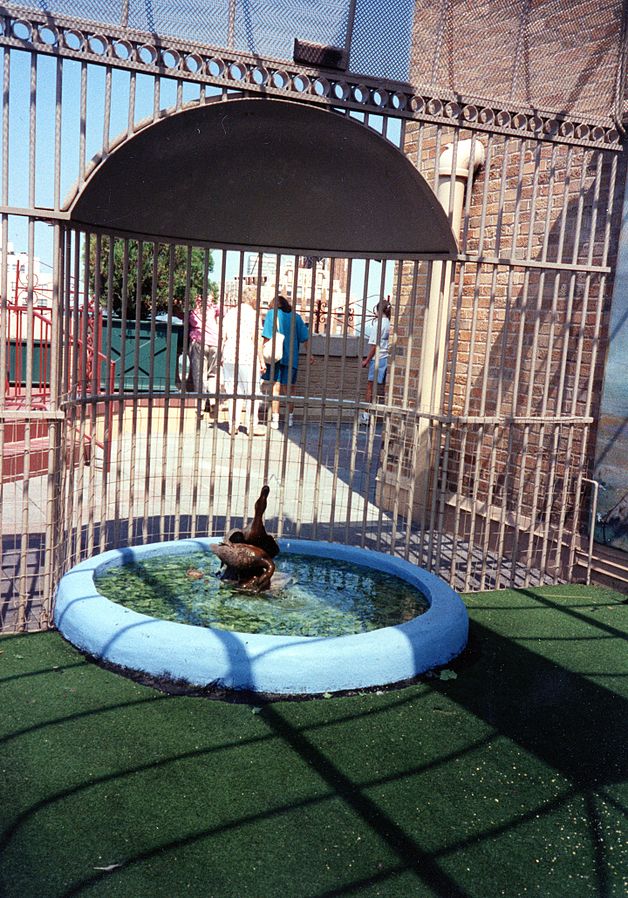 https://commons.wikimedia.org/wiki/File:Peabody_ducks_swimming_pool_by_PSavary.jpg
https://commons.wikimedia.org/wiki/File:Peabody_ducks_swimming_pool_by_PSavary.jpgGeese and ducks are water-loving creatures, and they require access to water where they can swim, splash, and fully wet their bodies.
A backyard pond is an ideal solution, providing them with ample space to swim and engage in natural behaviors.
If you don’t have the space for a pond, a child’s swimming pool can also work well for your pet barnyard birds. Just make sure the pool is deep enough for them to fully submerge and bathe comfortably.
Regardless of the type of water source, regular cleaning is necessary to keep it free from debris and bacteria, ensuring the health of your birds.
If you live in a smaller space or prefer to keep your geese and ducks indoors, providing them with a place to swim is still possible. Many pet owners have used their bathtubs as makeshift ponds, allowing their birds to enjoy a little swim time while keeping them indoors.
For indoor living, there are also creative solutions to help keep your home clean while still letting your birds roam freely. Y
ou can find specially designed diapers for ducks, geese, and chickens on websites like Etsy. These quirky, functional items can help prevent messes around the house and make it possible to enjoy having waterfowl indoors without worrying about accidents.
Not only are these diapers practical, but many of them come in cute designs, making your feathered friends even more charming while they waddle around the house!
However, whether inside or outside, it’s important to ensure that your birds have access to water frequently and are able to express their natural behavior, such as swimming, for their overall well-being.
Essential Care for Backyard Birds: Cleaning, Composting, and Sustainable Practices
Having backyard birds, such as chickens, ducks, or geese, can be a rewarding experience, but it also comes with its own set of responsibilities—especially when it comes to cleanliness.
I can speak from personal experience when I once had to keep a few chickens in my bathroom for a few months while they were in between homes. While it was a great way to temporarily care for them, I quickly learned just how diligent you need to be when it comes to cleaning.
Birds like chickens, ducks, and geese can be surprisingly messy. They poop constantly, and that waste can accumulate quickly.
If you're keeping your birds indoors, the smell can become overwhelming if you don't stay on top of things.
When they’re outside, the chicken coop, duck pen, or goose shelter requires regular maintenance as well.
For chickens, a bedding system is necessary to help absorb waste, and this bedding should be cleaned about once a week or more, depending on how many birds you have and how often they roam.
Removing the waste and replacing the bedding is crucial to keeping the coop clean, preventing odors, and maintaining a healthy environment for the birds.
The pond for ducks and geese presents its own set of challenges.
If you have a backyard pond, you'll need to keep the water clean and fresh to avoid bacteria buildup and keep your birds healthy.
The pond should be emptied, scrubbed, and refilled regularly. Without proper upkeep, stagnant water can quickly become a breeding ground for harmful bacteria, which can lead to illness for your birds.
Keeping the pond pristine will ensure your ducks and geese have a safe place to swim and drink.
On the positive side, all that waste isn’t just something you have to deal with.
Chicken, duck, and goose poop can be composted and used to fertilize your garden. It’s rich in nutrients and can help your plants grow strong and healthy.
Similarly, the dirty water from the pond, while not suitable for direct use in the birds' environment, can be excellent for watering plants in your garden. The organic matter in the water contains valuable nutrients like nitrogen, phosphorus, and potassium—essential elements for plant growth.
While keeping birds requires work, the benefits of sustainable farming practices, like using the waste for composting and feeding your plants, can help you create a healthy and eco-friendly backyard garden.
With diligence and the right care routine, you can make sure both your birds and your plants thrive.
The Importance of Socialization and Enrichment for Backyard Birds: Keeping Chickens, Ducks, and Geese Happy and Healthy
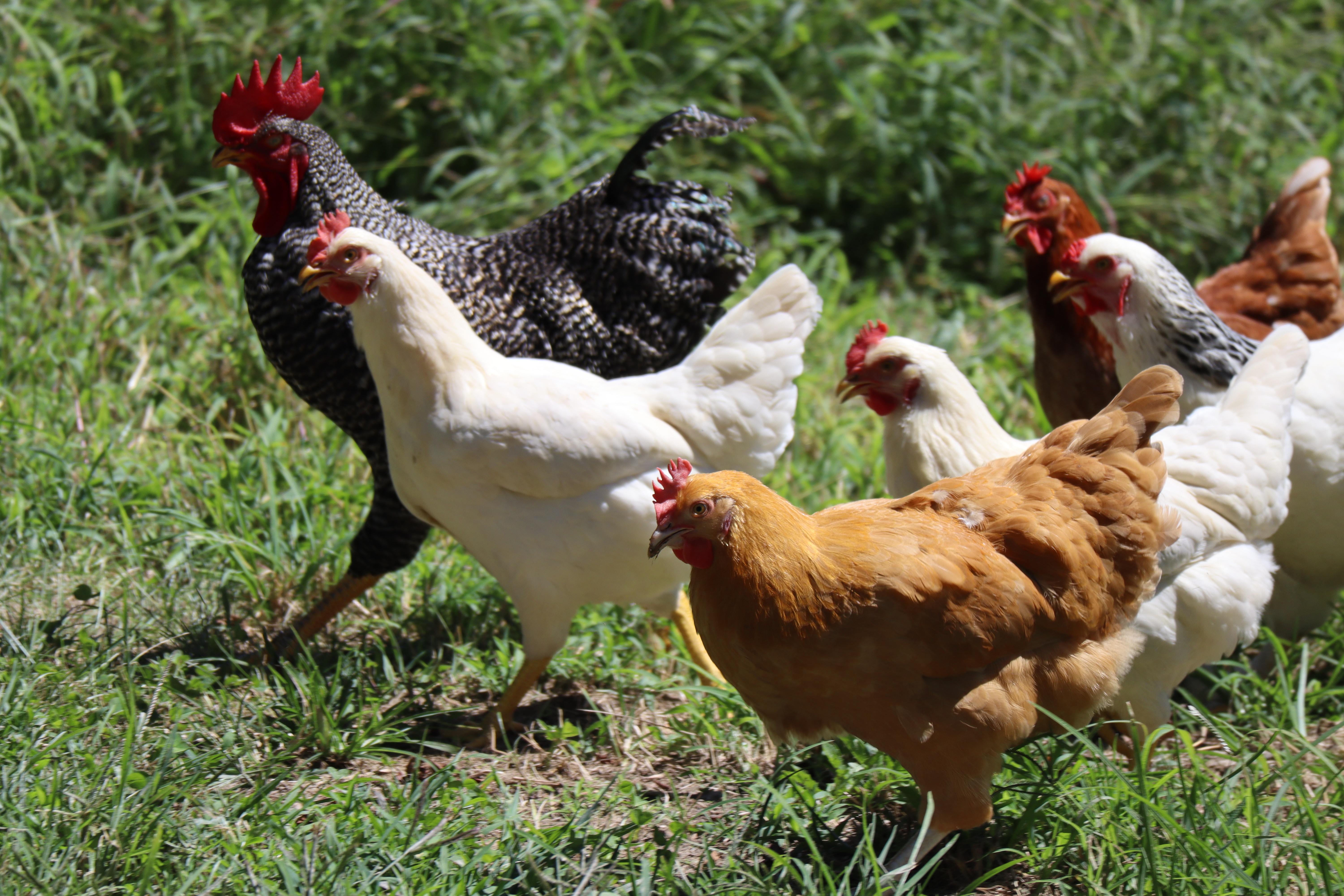 Photo by Zachariah Smith. https://unsplash.com/photos/white-and-brown-chicken-on-green-grass-during-daytime-ZSHYFvNN8hg
Photo by Zachariah Smith. https://unsplash.com/photos/white-and-brown-chicken-on-green-grass-during-daytime-ZSHYFvNN8hgBackyard birds, whether chickens, ducks, or geese, are naturally social creatures.
In the wild, they live in flocks, where they form bonds with one another and engage in a range of behaviors that keep them mentally and physically stimulated.
Therefore, it’s best to have at least two of the same species. Having a companion can help prevent loneliness and boredom.
However, if you only have one, you can make up for the lack of a flock by providing lots of attention, interactive toys, and interesting activities.
Surprisingly, a simple mirror can help alleviate loneliness by giving your bird a reflection to interact with, which can make them feel less isolated.
Giving your birds plenty of outdoor time is crucial for their well-being.
Chickens, in particular, love to forage and scratch around in the dirt.
They also indulge in dust baths, which help them keep clean by removing excess oils and parasites from their feathers. Providing them with a space where they can take these baths will make them feel more comfortable and natural.
Ducks and geese, on the other hand, enjoy grazing on fresh grass. They’ll often spend hours munching on the lawn, which contributes to a healthy diet and keeps them entertained.
It’s important to be mindful of where you let your birds roam. While they may enjoy the freedom of a yard, walking on concrete too much can be tough on their feet, especially for chickens. Try to provide a mix of surfaces, like grass or dirt, where they can roam without risk of injury.
For an extra bit of fun, try hanging fresh vegetables, such as cabbage or lettuce, from a tree or a post in your yard. This gives the birds something to peck at while also encouraging natural foraging behavior.
You can even scatter food around the yard to encourage them to search for their meals, making mealtime a fun and stimulating experience.
By varying where and how you feed them, you can ensure that your birds stay active, engaged, and happy.
By considering their social needs and providing plenty of enrichment, you’ll ensure that your backyard birds lead a fulfilling and enjoyable life.
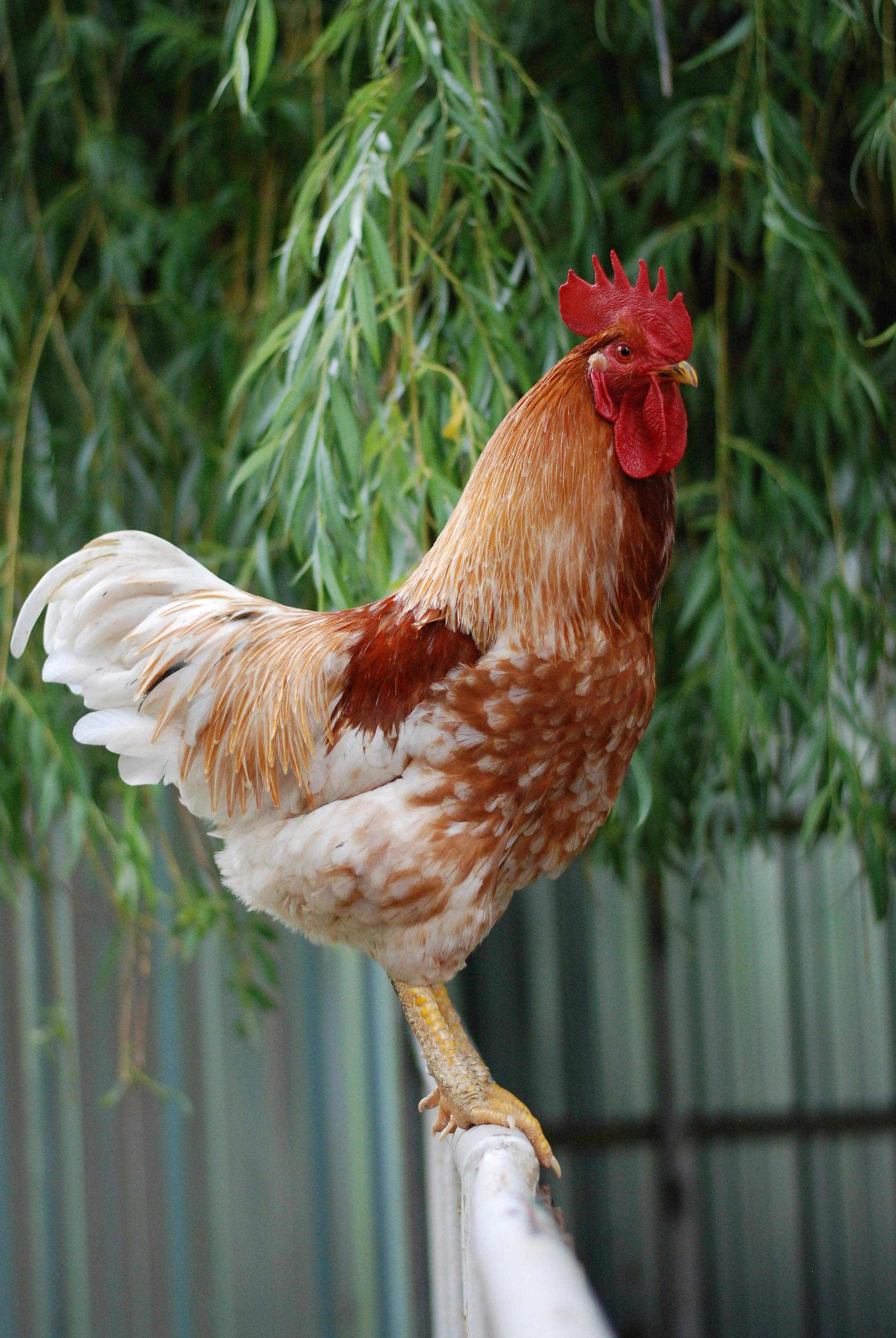 Photo by Martin Boháč. https://www.pexels.com/photo/white-and-brown-rooster-perched-on-metal-10475469/
Photo by Martin Boháč. https://www.pexels.com/photo/white-and-brown-rooster-perched-on-metal-10475469/Birds like chickens, ducks, and geese are highly intelligent creatures that thrive on mental stimulation and physical activity.
Providing them with a variety of enrichment opportunities will keep them entertained and engaged while promoting their natural behaviors.
Perches are a must for all these birds.
They love to climb and roost, so make sure their living space includes plenty of places for them to perch at different heights.
A simple yet effective option is to place an old Christmas tree in their pen. Not only does this give them something to climb, but it also provides them with a natural hiding place.
Adding ramps and platforms helps to mimic the environments they would find in the wild, giving them a sense of freedom and exploration.
Hiding spots are also essential.
Birds like to feel secure, so offering them places where they can retreat to when they feel overwhelmed is key. You can use boxes, shrubs, or even logs for this purpose.
Additionally, placing crickets or other insects in their pen will create an exciting, interactive hunting experience. It’s fun to watch chickens chase after the crickets, and it helps satisfy their foraging instincts.
Don’t be afraid to get creative with their enrichment.
Try a chicken swing, and your birds might have hours of fun rocking back and forth.
Alternatively, placing food on a xylophone can lead to an amusing sight, with chickens pecking at the keys—sometimes they may even play it just for fun!
The key is to provide a variety of activities that allow your birds to engage in natural behaviors, keeping them both physically and mentally fit.
For ducks and geese, a pond is essential. They love to swim and dive, and having access to water encourages exercise and good hygiene.
You can enhance their swimming experience by placing bright, enticing objects at the bottom of the pond. This encourages them to dive down and explore, making their water time even more fun and stimulating.
To add an extra layer of entertainment, consider adding moving visual stimuli. A mirrorball, pinwheel, or even a TV set to nature documentaries can captivate their attention.
These types of visuals simulate movement and activity, keeping their curiosity piqued. Birds are naturally drawn to motion, and these moving objects provide extra mental stimulation.
However, while enrichment is important, it’s crucial not to overdo the food-related activities. While it’s fun to scatter treats or make feeding time interactive, be mindful of your birds’ health.
Overfeeding, especially with high-calorie treats, can lead to obesity. Obesity can make it difficult for birds to move around, and it can cause various health problems.
Keeping a balanced approach to food and enrichment will ensure your birds stay happy, healthy, and active.
By offering a diverse array of activities and carefully considering their health, you’ll ensure that your backyard birds enjoy a fulfilling, well-rounded life.
Bringing Barnyard Birds into the City: Keeping Chickens, Ducks, and Geese Happy in Urban Environments
It’s absolutely possible to keep chickens, ducks, and geese as pets in the city, but there are a few important factors to consider to ensure they thrive in an urban environment.
While these birds can adapt to living in smaller spaces, they’re much happier and healthier when they have access to some outdoor space.
A bit of a backyard or a small garden is ideal for giving them the opportunity to engage in natural behaviors and enjoy a fulfilling life.
Living solely as indoor apartment pets, without the chance to explore, forage, and interact with the outdoors, is likely to leave them stressed and unfulfilled.
Chickens, ducks, and geese are all naturally social and active animals that need room to roam, scratch the ground, peck for food, or even take dust baths.
In a confined apartment setting, these instincts would be hard to satisfy, which could lead to behavioral issues and poor health.
For example, chickens need a safe space to scratch and dust bathe, ducks need access to water for swimming and foraging, and geese prefer to graze on grass.
Without access to these essential activities, they can become bored, stressed, and may even develop health problems related to inactivity.
In an apartment, space is usually quite limited, and there simply wouldn’t be enough room for these birds to engage in the type of activities they require.
Ducks and geese, in particular, need access to water, both for swimming and for cleanliness. A bathtub could suffice for a short time, but it's not a long-term solution for a waterfowl who needs a larger, more natural environment to thrive.
Likewise, chickens need a place to roost, and if confined indoors, they will be restricted from exhibiting their natural roosting behavior, which could cause distress.
A backyard, however, provides the perfect environment for these birds. Even a small yard can be transformed into a paradise for your feathered friends, offering them room to roam, forage, and engage in social activities with each other.
By giving them access to the outdoors, you allow them to live more naturally, just as they would in the wild, contributing to their physical, mental, and emotional well-being.
In an urban environment, it’s important to consider how much outdoor space you have available, as well as any local regulations regarding keeping poultry and waterfowl.
Many cities have specific zoning laws that may limit the number of birds you can keep or place restrictions on certain species.
For example, while some cities allow chickens, they may have rules about keeping roosters due to noise concerns.
Geese, on the other hand, are often subject to stricter regulations due to wildlife protection laws.
Despite these potential challenges, many urban bird owners successfully create safe and enriching environments for their chickens, ducks, and geese.
You can build simple enclosures or coops, set up a small pond or kiddie pool for waterfowl, and plant grass or other plants that allow your birds to enjoy their natural behaviors.
A well-designed outdoor space can give them everything they need to feel at home, even in a city.
In short, while it’s certainly possible to have chickens, ducks, or geese in the city, they require more than just a few square feet inside your apartment.
They need outdoor space to roam and explore, and most importantly, they need to have access to natural behaviors like foraging, swimming, and socializing with their flock.
With the right setup and proper care, urban bird-keeping can be a rewarding and fulfilling experience for both the birds and their owners.
You can also explore my pet pig page, or find out about other pets on my best pet for me page.



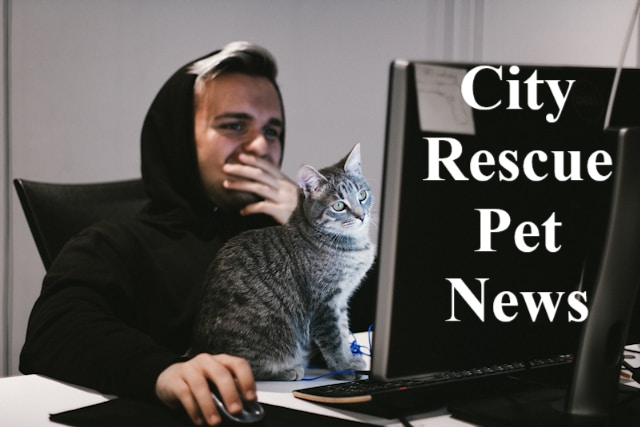



New! Comments
Have your say about what you just read! Leave me a comment in the box below.